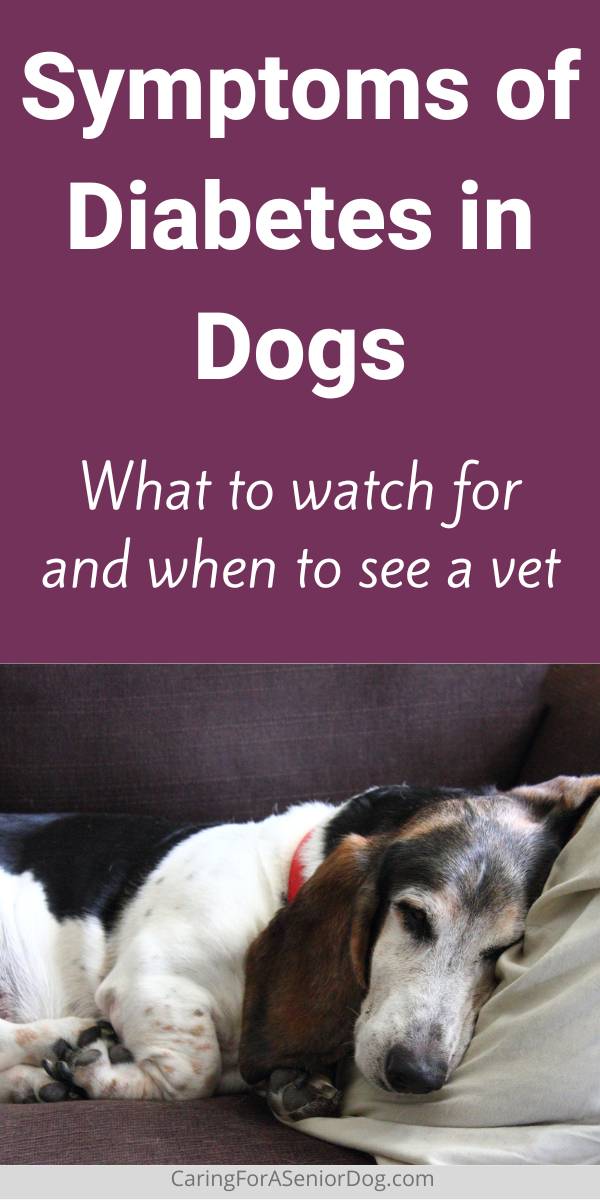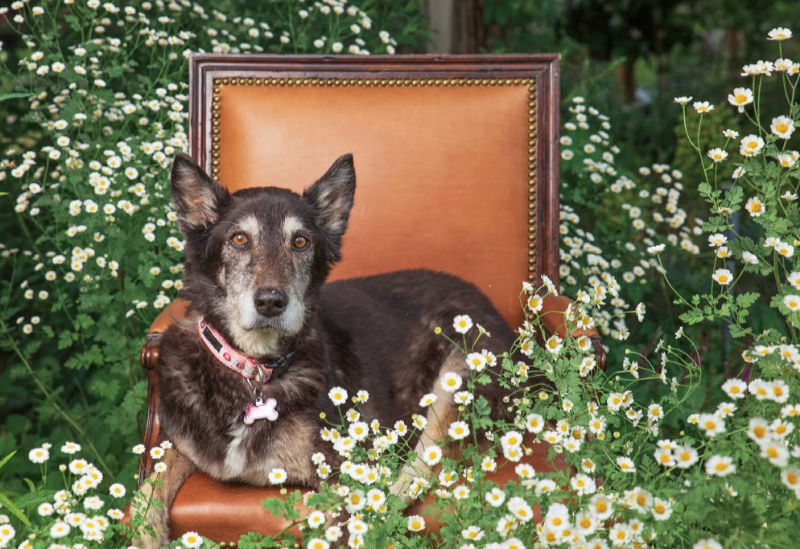As our dogs age, one key responsibility we have as dog parents is to be in tune with the more subtle changes in their activities and behavior.
While these changes may appear minor at first glance, they may also act as a red flag, alerting us that we should consider underlying health problems – like canine diabetes.
By learning the most common signs of diabetes in dogs, we can stay vigilant. This will help you recognize when trouble may be at hand.
Last Updated: Sept 28, 2023
Is My Dog Diabetic? Or Is It Something Else?
Many of the symptoms of diabetes in dogs are similar to those of other diseases. This can make it challenging to identify the real problem.
What else is new?
It seems like whenever I write about a particular disease, I say those exact words. Why? It’s because it’s often true.
Many symptoms of the more common ailments in dogs overlap, making our job as dog parents even more complicated.
But it’s not our job to diagnose the problem, that’s for the veterinarian. Instead, we need to be familiar with the signs something is “off” to recognize when a vet appointment is necessary.
The need to monitor for these “red flags” is even more critical as our dogs get older since a senior dog can go downhill much quicker than most younger dogs.
Plus, it’s always easier to treat a condition the earlier it is diagnosed.
There is no magic answer to determine whether the changes you see in your dog are from diabetes or another health condition without a vet visit.
Changes Can Be Subtle
Another critical point to remember is that your dog’s daily behavior changes may be subtle or hard to notice.
This is especially common in the earliest stages of the disease.
Your dog isn’t likely to pee normally one day and then go 6 or 7 extra times the next. A change like this could happen slowly over several weeks.
This is why a keen eye and familiarity with the most common dog diabetes symptoms is helpful.
Common Symptoms of Diabetes in Dogs
Some of what you will notice are early warning signs, others when the disease is more advanced, and then there are the effects diabetes has on your dog.
Here are some of the more common diabetes symptoms in dogs that you should be on the lookout for:
Drinking More Water and Peeing More
The excess sugar in a diabetic dog’s blood often causes an increased thirst.
As the dog drinks more water, they must pee more frequently and urgently than before this change.
Your first sign may be that you must fill your dog’s water dish more often or let them outside more frequently throughout the day.
If your dog is home alone while you’re at work, you may come home to “accidents” in the house.
Eating More
Diabetes directly impacts the amount of glucose being provided to the cells of your dog’s body.
If the cells aren’t getting enough glucose to maintain the usual function, they may trigger the brain to tell your dog that they are hungry more often.
Pay attention if your dog suddenly starts asking for meals more frequently or is acting hungry after eating their usual meal when they are usually satisfied.
Losing Weight
Despite eating more, you may notice that your dog is starting to lose weight.
Anytime a dog’s system cannot effectively use and process the nutrients in their food, this could be the result.
Specific to diabetes, your dog isn’t getting enough calories from the sugars in their diet.
Cloudy Eyes or Vision Problems
One of the easier-to-spot signs your dog is diabetic is the formation of diabetic cataracts in your dog’s eyes. This causes the eyes to look cloudy.
The cloudiness results from excess glucose in the fluids of the eye.
While several explanations exist for the development of cataracts in a senior dog, they all call for a trip to see the veterinarian.
The sooner your vet can examine your dog and suggest a treatment plan, the better the chance you can prevent them from going blind completely.
Loss of Energy
Blood sugar is like fuel for your dog, providing them with the energy their body needs to keep up with their daily routine.
When their blood sugar is too low, they aren’t getting the boost they need to maintain those energy levels.
An otherwise active dog may start to slow down, sleep more often, appear to lack the energy to get up, or even lose consciousness in the most severe cases.
Frequent Infections (Skin, Urinary, Etc.)
One complication of canine diabetes is its negative effect on your dog’s immune system.
As their immunity drops, your dog will be susceptible to developing infections more frequently. They will also have a harder time healing from these infections.
You may notice your dog getting urinary tract infections more frequently than in their younger years.
Another red flag is the development of an infection in a smaller wound on the skin that, despite proper care, continues to worsen instead of healing.
Thinning or Dull Hair
When a dog begins to suffer from skin-related problems, another area that often suffers is the quality of their fur.
This may present as patches of hair falling out and not growing back or their fur begins to lose its shine, looking dull and lifeless.
Your dog’s coat is often one of the earliest warning signs of trouble.
Vomiting
If a dog’s diabetes is left untreated for a period of time, it can cause a condition called diabetic ketoacidosis.
This occurs when the cells of the body aren’t getting enough sugar to use as energy. Instead, acids called ketones are produced.
When too many ketones build up, it can make your dog feel ill, triggering nausea and vomiting.
Depression
Another impact of an imbalance of ketones in a dog’s body is that it can directly impact your dog’s mood.
Your dog may suddenly show no desire to participate in activities they once enjoyed.
They may also appear mopey or stop responding to your attention and communication with the excitement they once showed.
Any time you notice your dog showing signs of depression, it is a sign that something isn’t right.
Causes of Diabetes in Dogs
How does a dog get diabetes? This is a question you may be asking yourself if your dog has recently been diagnosed with the disease.
There is no single cause of diabetes. Some common causes are unavoidable, while others can be addressed to reduce the risk of developing the disease.
The common causes of diabetes in dogs include:
- Age (most dogs are diagnosed at 5 or older)
- Unspayed females are more likely than dogs
- Obesity
- Chronic or repeated pancreatitis
- Long-term use of steroids
- Cushing’s disease
- Genetics (as they say, it runs in the family)
While none of these potential causes guarantees that your dog will be diabetic, they increase the risk of the disease developing.
What is the prognosis for a Diabetic Dog?
For many dog parents faced with a diagnosis, their biggest concern regarding diabetes in dogs is life expectancy – What is the prognosis for my dog?
It’s understandable to jump to this question!
The good news is that, when properly managed, many diabetic dogs will go on to live a long, happy life.
For most dogs, ongoing management will involve daily insulin injections and a change to your dog’s diet.
They will likely need to be fed a set amount of food each day on a specific feeding schedule to reduce fluctuations in their blood sugar levels.
It may also require switching your dog to a specialty diabetic dog food.
This will all take a commitment on your part, both financially and regarding your time (and schedule).
It will also require an open line of communication with your veterinarian, especially during the early stages, as you find the right balance of everything.
However, if you are willing to put the time, effort, and money into staying on top of your diabetic dog’s care, most can enjoy a long life without symptoms or complications.
Final Thoughts: Diabetes in Dogs
The biggest challenge in identifying that your dog has developed diabetes is that the most common symptoms are shared with many other health conditions.
However, learning the canine diabetes symptoms can help you recognize that something is “off” sooner.
If you notice any of these signs, contact your veterinarian for an appointment at your earliest convenience.
The earlier your dog sees a veterinarian and receives a diagnosis, the better their prognosis and the more likely they can live a long, happy life.
Does your dog have diabetes? What symptoms alerted you to the problem? Sharing helps others, so leave your comment below or on my Facebook page.



 What is Wrong With My Dog
What is Wrong With My Dog
This is so interesting – I hadn’t thought about the similarities between diabetes and renal disease. We’ve lost a pup to renal and one key difference I saw was the eating more – our experience was that he stopped eating one thing at a time, little by little, until he wouldn’t eat. With diabetes I can understand why the eating and drinking would become a key indicator. Poor little Josephine, did she go on insulin?
Sorry to hear about your pup Rebecca, it just sucks as my cousin and I always say when we lose a pet. There’s not much else we can say is there? I was giving Josephine insulin injections but we put her down not long after her diagnosis unfortunately. It had absolutely nothing to do with the fact she was deaf and blind, as she was like that since the day we adopted her a couple of years earlier. It was purely based on quality of life and what was best for her. An agonising decision but the right one for her. With all my animals who had kidney disease, the difference came down to the lack of interest in food.
Thanks Hindy, this information is so important. As dog owners we are the first to notice symptoms and changes in our animals’ behavior and diet. There are so many benefits to senior dogs and they can live long and happy lives with proper attention.
I agree with you Heather, if only more pet parents realised how instrumental they are in the health of their animals. Senior dogs can absolutely live long and healthy lives, but sadly many people hear “senior” and “sick with huge vet bills” at the same time.
Diabetes is also very common in older cats. Knowing the signs is so important to get dogs and cats the help they need as early as possible. Great post! Thanks for sharing.
You’re right Amy, although my cats usually had cancer or kidney disease, never diabetes so my only experience was with Josephine. I can’t talk enough about going to the vet when something seems “off” no matter how slight. Catching a problem as early as possible is key. So glad you found the post useful.
This is a vital post aht should alert people to the differences and similarities. You are not kidding when you say the symptoms are similar!
Josephine was a sweetheart and she knew when she was ‘home’ – your husband showed her that 🙂
He certainly did! She knew who to pick that’s for sure. For that reason I always say to call the vet if something seems “off.” There’s no point in wasting time trying to diagnose something yourself, since symptoms are similar in so many cases.
It’s hard enough in humans to tell the difference between all of these different diseases with similar symptoms, let alone with animals who can’t tell you how they’re feeling. Just another reason why it’s SO important to find a great veterinarian who you can trust. These symptoms sound like SO many other diseases. it’s crazy. At the first sign that something is “off” with our dogs, off to our trusted vet we go. I’m pretty sure we keep them in business, but alas. LOL
I agree with you Debbie. Similar symptoms, different diseases and the only way to tell if something is wrong is to know our pets well enough to tell when something is “off.” I thought we were the only ones keeping our vet in business!! Part of me thinks it would be interesting to know how much we’ve spent over the past few years, the other part would be annoyed because it could have bought me a new car, or a downpayment on a new house!
Great post. It’s scary how diabetes can easily be overlooked due to the subtle symptoms that present themselves that can easily be overlooked and attributed to “old age”. Being in tune with your dogs habits can make all the difference.
That’s so true Kamira, it’s about knowing our dogs and recognising behaviour changes. Too many people attribute changes they notice to the natural aging process when, in fact, it isn’t usually the case, and valuable opportunities to treat an illness or problem may have been lost.
Great post thank you and I am very vigilant with Layla especially as she gets older, if I have questions I email my vet and he always replies, if he thinks its an emergency he will tell me to bring her in
Layla is so lucky to have you. I’m always so stunned by the people who have older dogs yet don’t seem to bother with them very much, because they think all changes are related to age and there’s nothing to be done. Having a great vet is important no matter what age, but particularly important as our pets get older and we rely on them so much more for advice.
Yearly check ups and knowing your dog – key. And not brushing things off as “getting old” … and a vet that knows your dog and has followed your dog over years can be really helpful.
You’re so right Sonja, it’s important to not brush things off, but twice yearly check ups become more important as our pets age. Ideally you want a vet that has been with you for years, which is why I get so nervous when my vet isn’t there and I’m forced to see another one on staff. To them it’s just a dog with a problem, and have no idea of the healthcare plan my vet and I have discussed. Scary!!
You are correct. There are so many symptoms that are the same with many different illnesses. It’s important to monitor your pets closely and communicate with a vet if you notice changes, but especially in senior dogs and cats.
I think the best thing to do, especially for anyone sharing their life with a senior pet, is to have a blanket plan of action. Any changes, no matter how subtle, even if you just have a feeling something is off, call the vet. It takes the guesswork out of trying to figure out when to go, when to call…
This is very important info. Thanks so much for sharing. I didn’t know the symptoms for diabetes in dogs so I will definitely keep this in my memory bank!
So many illnesses have similar symptoms it can be hard to know what’s what. I was sure Josephine had kidney problems since all signs pointed to that, and it turned out to be diabetes. Any changes best to call the vet and get an appointment quickly.
This is a great reference! I haven’t personally had a pet with diabetes, but I have had a few friends that did. I’m definitely saving this for later.
Thanks Jessica, so glad you found the post informative. I think the safest thing to do, especially if you have senior pets, is to call the vet at the first sign no matter how subtle it may be. Better safe than sorry to quote a cliche.
The only symptom I knew to watch out for was increased thirst. Thanks for giving the bigger picture, it is very helpful! All 3 of my dogs are close to being considered seniors 10-7, but they are small, so I think they are more middle aged. I am starting to observe them more closely now.
You’re right to start watching them more closely, but hopefully you won’t be as obsessive as I am. I think if Red could talk she’d tell me to stop staring at her all the time!!